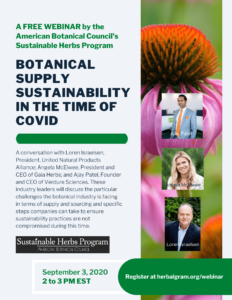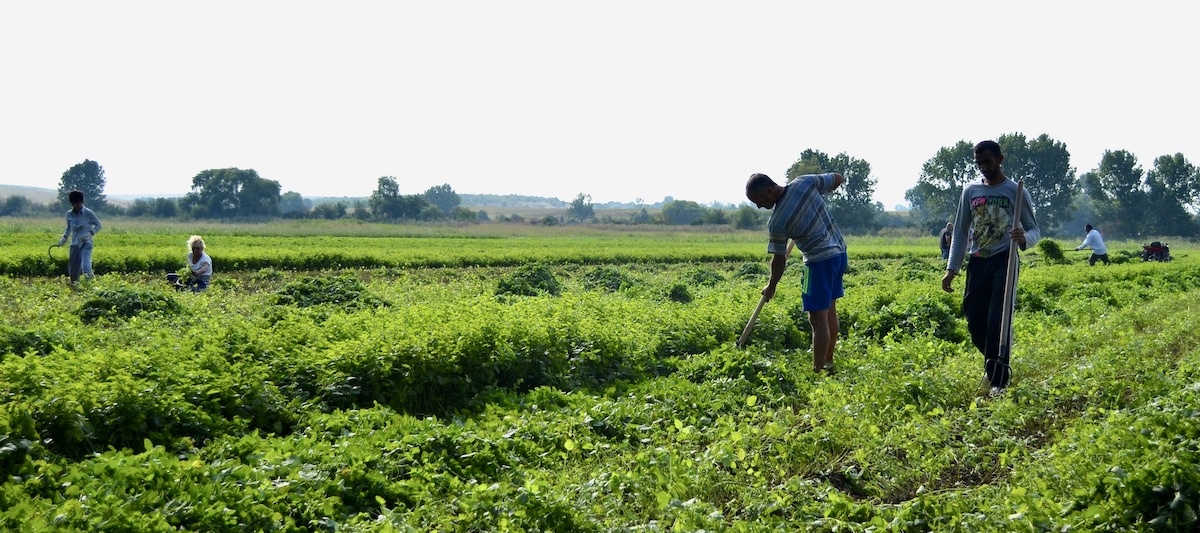“I believe COVID is really just a warm-up, a stress test for what will come when we begin to see the real effects of climate change.”
– Loren Israelsen, UNPA
 SHP Director, Ann Armbrecht spoke with SHP Inaugural Underwriters, Loren Israelsen, President, United Natural Products Alliance, Angela McElwee, President and CEO of Gaia Herbs, and Ajay Patel, Founder and CEO of Verdure Sciences about the challenges the botanical industry is facing because of COVID and steps companies can take to ensure sustainability practices are not compromised.
SHP Director, Ann Armbrecht spoke with SHP Inaugural Underwriters, Loren Israelsen, President, United Natural Products Alliance, Angela McElwee, President and CEO of Gaia Herbs, and Ajay Patel, Founder and CEO of Verdure Sciences about the challenges the botanical industry is facing because of COVID and steps companies can take to ensure sustainability practices are not compromised.
To listen to our hour long conversation, see the complete recording here.
Advance Planning Pays Off
Verdure Sciences got wind of COVID-19 early on, Ajay said, and took immediate measures to prepare for remote working, implement sanitation practices, and enhance communications across their core network. They set up a task force with leaders from supply chain, quality, compliance and service, sales, and their manufacturing partner operations. They tried to be proactive by increasing purchases of raw materials and production capacities while also working with their customers to try to understand their long term need for key ingredients and botanicals.
Yet much of the impact was outside their control. The lock down in China and India led to chaos in shipping logistics. Raw material was stuck at ports. In some cases ships and containers were in the wrong places. Since cargo moves on passenger planes as well, slow down in air traffic stalled shipments.
There are personal impacts as well. “People have called this the great pause,” Angela said. And yet the herbal industry is booming. “As humans we have this pause in our personal lives, our children aren’t going to school or are now at home doing school online. But our businesses are accelerating at a pace that is very much at odds with our personal capacity or our team’s personal capacity. And so, there is that human element to that. We all feel that, farmers, manufacturers, everyone.”
Lessons Learned
As Angela said, “How do we prepare for the next crisis?” Below are 9 lessons learned so far.
- Risk of Adulteration Supplement companies, deemed essential work, faced immediate challenges of protecting staff and workers. The FDA shut down inspections. Without travel, audits and certifications can’t take place. Sourcing staff couldn’t travel physically to see where their products and plant materials are coming from. At the same time, consumer demand shot up, creating a spike in demand resulting in shortages of botanical raw materials. All of this has increased the risk of adulteration and other quality control issues. A huge increase in demand for Ayurveda herbs by the Indian market added a supply need that wasn’t there before, Ajay said, contributing to risks of adulteration.
- Demand outstrips supply “Echinacea is a two-year crop,” Angela said. “When we sell roughly nine months’ worth of inventory in a month, we can’t magically produce more echinacea in a six-week time period. That creates choices within any business… is it better to produce something below our specifications and put it in a product? Or do we intentionally go out of stock for a period of time?” That’s a difficult choice for any company to make. “It’s a value stress test,” she added. Read this SHP blog post about the trade off between staying in stock and compromising standards.
- Diversify Supply Networks These weaknesses revealed an over-dependence on China and India for raw material. Loren and Angela both mentioned the importance of diversifying sources, developing ones closer to home, in Mexico, Central and South America as well as the United States.
- Inequities Made Visible Pre-existing inequities in the supply network have been amplified by COVID. Ajay, Loren and Angela all talked about the importance of botanical companies taking the lead to address these inequities by investing in rural communities, and work toward ensuring that pricing provides a living income to farmers and wild harvesters among others in the supply network.
- Education “The industry has forced the risk and the hard ethical decisions about quality and sourcing onto those growing and harvesting herbs, the ones with the fewest resources to address those issues,” Loren said. “At the same time, more people are entering the industry from venture capital, with backgrounds in law, finance and business. This means there is a growing separation from the traditional historic connection to the land, to the plants, to the healing traditions and to the hard work needed to bring these botanicals to market.” Education is the key to helping close this separation. “I would love to get a busload of those executives and take them on a week’s road trip to pick saw palmetto berries for a while,” Loren said. “That’d be an education.”
- Transparency and Strong Partnerships Not surprisingly, companies with strong partnerships with their suppliers have had a greater chance of continuing to get the botanicals needed. Which means relationships and trusting your partners and transparency in the supply chain are essential. As Ajay said, “We are not in the spot business. We cannot operate in the spot business anymore. We need to have commitments and visibility and contracts from our customers so we can plan ahead.” Watch the SHP video, Relationships through the Supply Chain, for more information.
- Price Investing in farming and harvesting communities to source high quality raw material takes time and resources. And yet companies that make these investments must compete on the shelf with those who don’t. Angela asked, “How do we talk about quality and price in a way that we’re all in this together and is productive? We need to ask how the industry measures success? Is it strictly in financial terms?” She continued, “Nature doesn’t work that way. Can we learn to model our businesses to be more like nature, in a more sustainable, more regenerative way?”
- Pick a Plant I asked what ways there are for companies to come together to tackle problems such as systemic inequities, adulteration, raw material shortages, climate change, and the many other challenges that transcend any one company. Angela suggested that companies pick one botanical where farmers are at risk financially and collaborate to develop ways to address those challenges. For specific steps on picking a plant to deepen your sourcing strategy, read SHP blog post, “Pick a Plant,” by Josef Brinckmann.
- Sharing Risk and Collaboration Loren said that we need to create a model where risk is shared. “We have to de-risk the agricultural part of our industry. We can buy insurance for our enterprises. As brands you can insure your factory and a lot of risks. Our farmers that grow our products have virtually no way to do that. I think we have enough capital, enough wealth just in our industry in the US to create a vehicle to help farmers to provide the incentives to reduce the risks… It is only one of many steps to need to be taken.”
Consumer Trust
I ended by asking what is at stake if companies don’t begin to tackle these issues on a greater scale. Angela replied, saying that at stake is consumers trust in the quality of these products and their trust that the industry is doing what it claims, that it is doing right by the plants, the people, and the environments.
To continue the conversation, join The Business Case for Sustainability: A conversation with Brian Zapp from Applied Food Sciences and Andrea Zangara from Euromed Thursday, October 1, 2020, 2:00 PM – 3:00 PM EDT


Comments